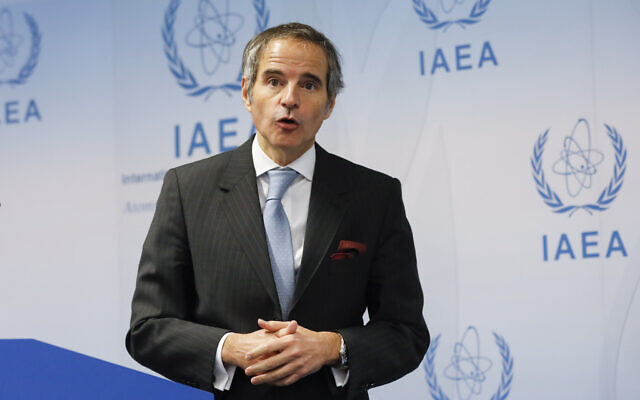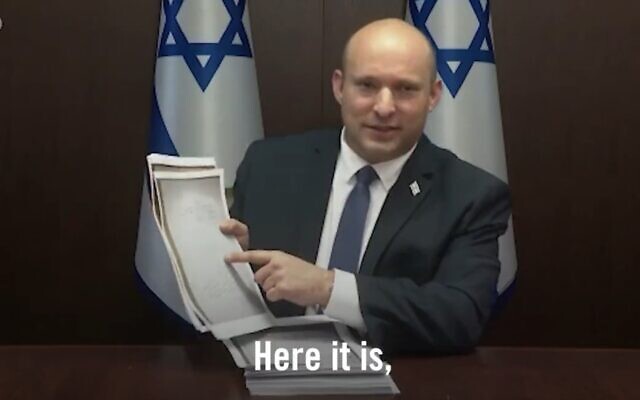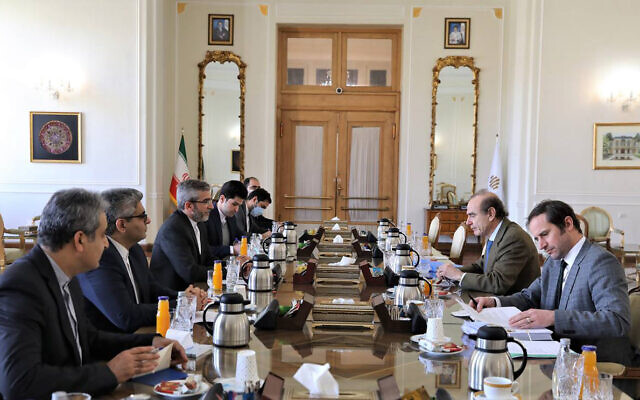Visit comes amid stalled Iran nuclear talks, days after Israeli prime minister published documents he said prove Iran spied on the IAEA

The director of the UN’s atomic watchdog arrived in Israel on Thursday and was set to hold talks with Prime Minister Naftali Bennett and other senior officials.
The visit by Rafael Grossi, the director-general of the International Atomic Energy Agency, comes as Israel expresses mounting concerns about Iran’s atomic activities and any potential return to the 2015 nuclear agreement between Tehran and world powers.
Israel is widely believed to be the only nuclear-armed state in the Middle East but has never publicly acknowledged having such weapons.
Bennett’s office said he would meet with Grossi on Friday.
Earlier this week, the Israeli prime minister accused Iran of stealing classified documents from the IAEA and using them to deceive international inspectors nearly two decades ago. He released what he said were some of the documents in question. Iran has dismissed the allegations as lies.
Israel was a staunch opponent of the 2015 nuclear deal and welcomed the Trump administration’s unilateral withdrawal from the agreement, which caused it to collapse. However, a growing number of current and former security officials have begun saying that the withdrawal was a mistake, as it has led to Iran accelerating its nuclear enrichment efforts.

The Biden administration has been trying to renew the accord, which lifted sanctions on Iran in return for limits to and oversight of its nuclear program.
Iran has always said its nuclear activities are for purely peaceful purposes but has stepped up uranium enrichment after the collapse of the nuclear accord to near weapons-grade levels.
US intelligence agencies, Western nations and the IAEA have said Iran ran an organized nuclear weapons program until 2003. Neither the US nor Israel has ruled out the use of military force to prevent Iran from developing a nuclear weapon.
The IAEA board of governors is slated to hold a meeting Monday for which Britain, France, Germany and the US have prepared a draft resolution “calling on Iran to cooperate on the question of undeclared sites,” according to a European diplomatic source.
“We will respond firmly and appropriately to any unconstructive action at the board of governors,” Iranian foreign ministry spokesman Saeed Khatibzadeh said in a response statement.
Earlier this week, the IAEA published a report estimating that Iran’s stockpile of enriched uranium had grown to more than 18 times the limit agreed on in the troubled 2015 pact known as the Joint Comprehensive Plan of Action.

It “estimated that, as of May 15, 2022, Iran’s total enriched stockpile was 3,809.3 kilograms.”
The limit in the JCPOA was set at 300 kilograms (660 pounds) of a specific compound, the equivalent of 202.8 kilograms (447 pounds) of uranium. The report also said that Iran was continuing its enrichment of uranium to levels higher than the 3.67 percent limit in the deal.
The stockpile of uranium enriched up to 20% is now estimated to be 238.4 kilograms (526 pounds), up 56.3 kilograms (124 pounds) since the last report in March, while the amount enriched to 60% stands at 43.1 kilograms (95 pounds), an increase of 9.9 kilograms (22 pounds).
Enrichment levels of around 90% are required for use in a nuclear weapon.
Both American and Israeli officials have assessed that Iran now needs only a few weeks to amass enough fissile material for a bomb, should it choose to make one, though it would need additional time to assemble the device’s other components.
The twin reports came as talks in Vienna to revive the JCPOA remain deadlocked after stalling in March.
One of the main sticking points is Tehran’s demand — rejected by Washington — that the Islamic Revolutionary Guard Corps, the ideological arm of Iran’s military, be removed from a US terrorism blacklist.
As reported by The Times of Israel
